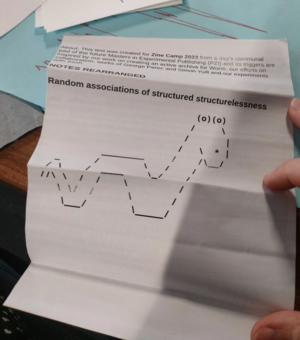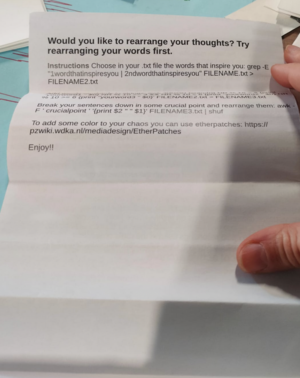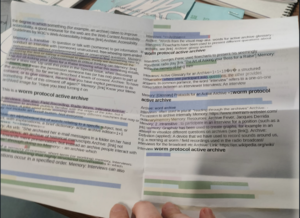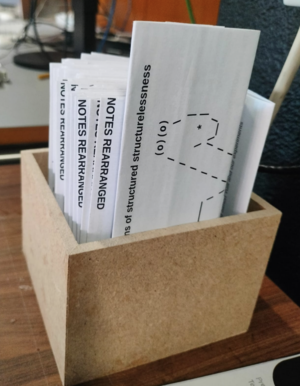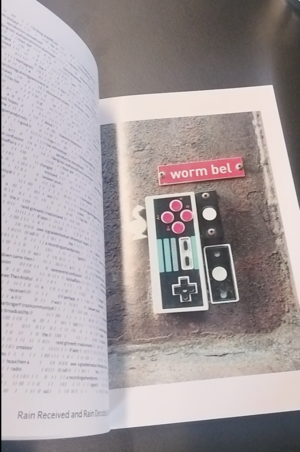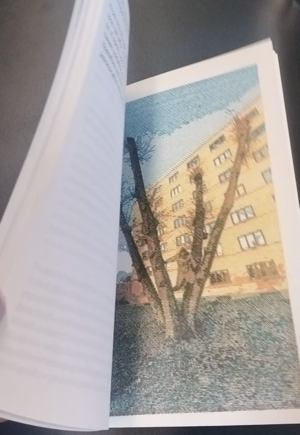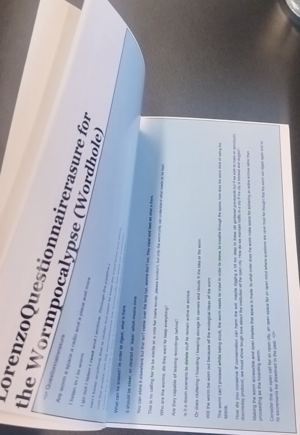User:Mxrwho/Assessssssment
A non-linear presentation
General direction and starting point
Main interests: Language as a collection of segments but also as the non-static, ever changing space of making meaning, the (futile) effort to make language static, to give meaning a permanence that is unnatural, to colonize and monopolize it, the dynamics and importance of language in relation to a person's connection to society and the self.
Influence of the course
I found bash and text manipulating capabilities (commands such as grep, awk, shuf, but also fortunes and aliases) very inspirational, as well as texts and talks connected to the politics of computational language (eg. choices regarding the interpretation of data, or the forming of commands and concepts).
I enjoy comparing how different fields approach language and meaning, and exploring boundaries: Eg. How does computer science perceive language in comparison to semantics, pragmatics, sociolinguistics? What biases affect language aesthetics? To what extend can we use concepts such as intentionality (both in its philosophical and literary-theory sense) and reader-response, interactionism (in its micro-sociological sense) and psychoanalytic symbolism to analyze and manipulate meaning? What is the role of error in making meaning?
____________________________________
Random Associations of Structured Structurelessness
I worked on the text from Wednesday's 11/10 pad and used the commands grep
( grep -E "==Archive==|==Interviews==|Memory" 1.txt > 1a.txt )
and awk
( awk 'BEGIN {srand()} NR % 10 < 3 {print "Archive: " $0} NR % 10 >= 3 && NR % 10 < 6 {print "Interviews: " $0} NR % 10 >= 6 {print "Memory: " $0}' 1a.txt > 1b.txt )
to cut and rearrange the text and add the words "archive", "memory" and "interviews".
I used the awk and shuf command further to break and rearrange the sentences
( awk -F ' is ' '{print $2 " " $1}' 1.txt | shuf),
turned the text into html and edited it in sublime to give it a form and add some bold lettering ("the worm protocol active archive" was an accident in a way [my intention was to have these words in bold inside the text, but I apparently didn't code it as I should] but I like accidents too) and did some manual editing (replaced most links with [link] to keep the online feel but also create a sense of absence. Overall I like the associations created within the text that run a bit freely.
A visual element was added by Thijs, the file was converted to .pdf with weasyprint, I asked Senka and Alessia about their opinion regarding ways to fold, and adopted Senka's idea. I also decided to use the box I made in the wood workshop as a container for the folded 'recipes'.
____________________________________
Manual for Post-apocalyptic Radio Making
The apocalypse is an editorial space. On the basis of a pending catastrophe we are called to decide upon the relevance of archives in the future and make choices based on our informed judgement and the needs that we imagine a future society will have in order to (re)build itself and in connection to radio making.
To connect SI22 to the apocalypse narrative I used the transcripts of the interviews we had on 7/11 (rendered by Riviera and Rosa) with prominent Radio WORM radio makers (Lucas, Lieuwe, Ash and Florian) as a radio activation manual and radio community survival guide. Riviera typeset it with ConTeXt and Alessia helped in the printing and binding process. The publication includes photos of WORM as well as an appendix with relevant works of other XPUB1 2023-25 students, a preface, epilogue and introductory texts to its parts. It serves as a manifestation of the post-apocalyptic narrative, as a tribute to Worm RADIO, and as a thank you gift to the makers who opened their arms and studio for us.
In this post-apocalyptic narrative the sense of community is central as well as the desire to establish practices that can be followed and sustained with the minimum possible resources. The archival elements should be economical but also supporting a positive climate of collaboration between the members of an emerging community. The apocalypse is not seen as a frustrating end of things but as an opportunity for a clean start upon the ruins of what might have been good at parts but was also essentially burdening us with its insufferable weight.
You can read the book here: https://hub.xpub.nl/bootleglibrary/book/866
____________________________________
Future
An installation that will allow the visitor to experience language units (eg. words, sentences, maybe even phonemes as organic elements) as objects, explore the impact these objects have on them, challenge and change them (so, exposing the importance of the narrative and our power over it, understand that every construct can be deconstructed and rebuilt).
Biggest challenge
Narrowing it down i.e. formulating it better.
Readings
Languages and Automata (Alexandra Silva)
Regular Languages and Finite Automata (Andrew Pitts)
Mainframe Experimentalism (Hannah Higgins)
Computing as Writing (Andrew Pitts)
Phenomenology of Spirit (GWF Hegel)
Other influence, in my personal practice
Sound: Field recording as practice and using sound as a tool, embracing imperfection:
My approach has changed since we worked on loops and field recordings: I started recording my works on the go, and even adopted in my last work a less curated video recording approach.
Implemented the html and css on my personal page and used imagemagick ( composite -blend 20 -gravity center Untitled2.1000x.png Untitled1.png Untitled3.png ) to enhance the visual aspect

